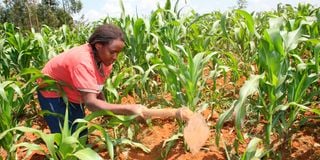GMO or not; that’s the question

A farmer weeds her maize crop at Yamumbi in Uasin Gishu County. Small farmers will be crowded out by major GM foods growers because, to turn a profit, they must gravitate towards monoculture.
What you need to know:
- The President's move was either a very one or, depending on how you look at the matter, quite risky.
- Small farmers will be crowded out by major GM foods growers because, to turn a profit, they must gravitate towards monoculture.
- One of the problems with GMOs is that introducing them into a country’s agriculture system is irreversible.
Faced with the moral dilemma of watching thousands of Kenyan children suffer hunger and malnutrition or allowing science to sort out the problem of food scarcity, President William Ruto on October 3 chose the latter option, lifting the ban on genetically modified food imports and production through an executive order.
Many people thought he got it wrong by rushing headlong when he should have tiptoed around the issue, but then again he probably reasoned that allowing a prolonged debate on the matter would be a dereliction of duty in a time of crisis.
By lifting the ban, which has been in place since 2012, he joined a very small club of African countries that have gone GMO, which include South Africa, Malawi, Sudan and Burkina Faso.
This was either a very bold move, or, depending on how you look at the matter, quite risky.
But the reasoning was impeccable. Already 31 counties are in dire need of food aid, and here we are not just talking about the usual suspects in Northern Kenya.
We are talking of previously food self-sufficient counties like Nakuru, Murang’a, Kiambu, Kirinyaga and a few others in the old Nyanza Province being on the verge of starvation.
Disaster in the making
We are talking of a disaster in the making unless the government puts in place urgent mitigation measures.
Now, apparently, it has done so by allowing the importation of maize and other grains from those countries that have such foods in abundance but mainly use them as animal and poultry feed.
According to experts who applaud the move, there is no evidence that eating meat, milk and eggs produced by animals fed on GMOs does any harm to the human body, but then again there is little mention of what happens when people ingest such foods directly for a prolonged period.
However, major biotech corporations have no qualms about lobbying for the consumption of this stuff by the starving millions in Africa and Asia, which should give us food for thought.
If the American public does not consume modified foods directly, why are its corporations so intent on feeding Kenyans such products?
It is quite illustrative that four days after the lifting of the ban, the US Grains Council was the first such entity to applaud the move.
Crowed an excited lobby spokesman: “This announcement is a key turning point in the development of Kenya’s food and feed market…. It will allow Kenya to meet the challenges of growing demand as consumption increases and as it faces the challenges associated with climate change.”
Seeking a ready market
Quite altruistic sentiments, but when we learn that the Grains Council’s main job is to “develop export markets for barley, corn (maize), sorghum and related products”, it is easy to see where these guys are coming from, and why they pile pressure on African governments to allow GM products.
They are seeking a ready market, damn the consequences. In April this year, the US Trade Representative, Ms Katherine Tai, did not mince words when she decried Kenya’s recalcitrance on that front.
“Kenya’s GMO ban has blocked US government food aid and agricultural exports derived from biotechnology,” she lamented.
Is it any wonder that many observers detect sinister motives in this attempt to tie food aid to the lifting of the GMO ban?
Indeed, it is these suspicions that must have prompted Mr Raila Odinga and Mr Kalonzo Musyoka to strongly oppose the lifting of the ban on Tuesday.
They have a case. Multinational corporations that have patented GM crops also dictate what inputs to use and their prices, meaning that you operate through the goodwill of biotech monoliths like Bayer and its subsidiary, Monsanto.
Other “rogues” in this gallery include Syngenta, which has a heavy Kenya presence, BASF and Dow Chemicals.
Says Mr Musyoka: “Our biodiversity and national pride in organic seeds will forever be lost to mutated crops. GM crops cannot co-exist with organic and non-GM crops due to contamination.”
Another area of great concern has, quite ironically, everything to do with one of biggest advantages of GM crops.
When their genes are modified, they become resistant to pests and disease, which means the yields are much higher by as much as 40 per cent.
In a food-insecure country like ours, this sounds like manna from heaven.
But truly, cross-pollination is a great danger leading to the gradual loss of the genetic makeup of traditional crops and the resultant loss in biodiversity.
Even worse, small farmers will be crowded out by major GM foods growers because, to turn a profit, they must gravitate towards monoculture.
Until GM foods are demonstrably proven to be safe, many Kenyans would rather err on the side of caution.
Certainly, their views should not be swayed by the arguments that the best way to feed a nation is to ease access to food aid.
They would rather the government sought ways to produce adequate food through smart agricultural practices and plenty of water.
One of the problems with GMOs is that introducing them into a country’s agriculture system is irreversible.
There is no way to ban GMOs once they take root in a country.
Mr Ngwiri is a consultant editor; [email protected]





